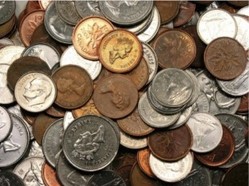Let's do some money saving math for a minute here. Suppose for a moment that you are a pack a day smoker and the brand you like costs about $10. If there are 30 days in a month, that's $300. Now I know that quitting cold turkey is hard to do, but the beauty of the Wealthy Smoker plan is that you don't have to quit outright to make it work. Even if you don't like bagpipes, I'm sure you can find something fun to do with an extra $300 every month or two.
Here's how it works:
Step 1: Calculate the cost per cigarette for the brand you smoke.
For example, if your brand costs $10 a pack, and there are 20 cigarettes in that pack, then $10 divided by 20 cigarettes equals $0.50 per cigarette.
Step 2: Figure out how many cigarettes you smoke a day and how much this costs.
If you're spending $0.50 per cigarette and you smoke 10 cigarettes per day, then this amounts to $5 per day in cigarettes. If you smoke 20 cigarettes a day then that would mean you're spending $10 a day.
Step 3: Create about 5 to 10 "fun goals" of various sizes and costs.
Let's say you would like to take your family to the Tattoo we saw in the video, and let's assume that cost would be approximately $200 for your family.
You determine you would also like to pay off your car loan a bit quicker too, and figure out that each bi-weekly payment is about $120.
Your next goal is to take your family out to a nice restaurant for dinner. You feel that will run you approximately $75 by the time everything is said and done.
Another goal might be a nice haircut at a salon: $35 if you're a man, $135 if you're a woman (a joke, but pobably not far off).
And a small goal: Order a pay-per-view movie for your family and buy some popcorn - a $20 cost, you figure.
Step 4: Divide each goal in to "daily chunks."
Let's look at the 10 cigarette a day example. That means, a day of not smoking would save $5. Rounded to the nearest $5, that means the "dinner out with the family" goal would represent 15 full days of not smoking.
Alternatively, smoking only 7 cigarettes one day, 8 cigarettes the next day, and 5 cigarettes the third day would add up to 10 less cigarettes smoked, and therefore $5 total saved.
Create a spreadsheet (or any kind of chart) with an appropriate number of "one day chunks" for each goal. Each time you save a full day's worth of money/cigarettes, check off one box. You can check off the various boxes in any order you please (e.g., you may choose to check off a box for the movie first, and next the car, then the hair cut, then the hair cut again, and then maybe the car again, and next the Tattoo, etc.)
Step 5: Purchase your goal guilt-free.
Once you fill up all of the boxes for a given goal with check marks, you can choose to purchase that goal (e.g., take your family out to dinner) Or you can choose to save that money into an investment of your choice.
I hope this works for you. Check back for the full version of this plan with its own page, created with the help of my friend Super Saver Chris.



 RSS Feed
RSS Feed